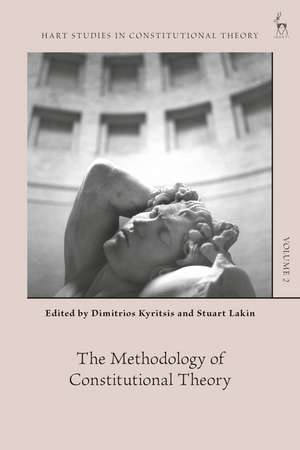The Methodology of Constitutional Theory: Hart Studies in Constitutional Theory
Editat de Dr Dimitrios Kyritsis, Dr Stuart Lakinen Limba Engleză Paperback – 14 iun 2023
| Toate formatele și edițiile | Preț | Express |
|---|---|---|
| Paperback (1) | 324.03 lei 6-8 săpt. | |
| Bloomsbury Publishing – 14 iun 2023 | 324.03 lei 6-8 săpt. | |
| Hardback (1) | 603.40 lei 6-8 săpt. | |
| Bloomsbury Publishing – 23 feb 2022 | 603.40 lei 6-8 săpt. |
Preț: 324.03 lei
Preț vechi: 393.27 lei
-18% Nou
Puncte Express: 486
Preț estimativ în valută:
62.01€ • 67.33$ • 52.09£
62.01€ • 67.33$ • 52.09£
Carte tipărită la comandă
Livrare economică 22 aprilie-06 mai
Preluare comenzi: 021 569.72.76
Specificații
ISBN-13: 9781509957699
ISBN-10: 1509957693
Pagini: 464
Dimensiuni: 156 x 234 x 25 mm
Greutate: 0.62 kg
Editura: Bloomsbury Publishing
Colecția Hart Publishing
Seria Hart Studies in Constitutional Theory
Locul publicării:London, United Kingdom
ISBN-10: 1509957693
Pagini: 464
Dimensiuni: 156 x 234 x 25 mm
Greutate: 0.62 kg
Editura: Bloomsbury Publishing
Colecția Hart Publishing
Seria Hart Studies in Constitutional Theory
Locul publicării:London, United Kingdom
Caracteristici
Expert analysis of the various challenges currently facing UK constitutional law
Notă biografică
Dimitrios Kyritsis is Reader at the University of Essex, UK.Stuart Lakin is Associate Professor at the University of Reading, UK.
Cuprins
The Methodology of Constitutional Theory - Introduction Dimitrios Kyritsis, University of Essex, UK and Stuart Lakin, University of Reading, UKI. Background II. The Scope of the Volume III. The Chapters and Thematic Groupings SELF-UNDERSTANDINGS1. The Significance of the Common Understanding in Legal Theory NW Barber, University of Oxford, UKI. Adherence to the Common Understanding II. Paying Attention to the Common Understanding III. The Limitations of the Common UnderstandingIV. Conclusion 2. In Defence of Traditional Methodologies Jeffrey Goldsworthy, Monash University, The University of Melbourne, and The University of Adelaide, AustraliaI. Introduction II. The Orthodox Understanding III. Judicial Pragmatism IV. Confusion between the Common Law and Other Kinds of Law V. Constitution-making by Judges VI. Legal Philosophy VII. Parliamentary Sovereignty Today 3. Constitutional Methodology and Brexit: Adopting a Model-Theoretic Approach Alison L Young, University of Cambridge, UKI. Defining Model-Theoretic Approaches II. What is Distinctive about a Model-Theoretic Approach to Constitutional Theory? III. Why Adopt a Model-Theoretic Approach to Constitutional Theory? IV. Brexit and Parliamentary Sovereignty V. Conclusion HOW DO FACTS MATTER?4. Slaying the Misshapen Monster: The Case for Constitutional Heuristics TT Arvind, University of York, UK and Lindsay Stirton, University of Sussex, UKI. Introduction 3II. Facts, Theories and Traditions: Making the Constitutional World III. A Methodology for Constitutional Theory IV. Heuristics and the Limits of Rhetoric V. Conclusion 5. Why Common Law Constitutionalism is Correct (If It Is) Stuart Lakin, University of Reading, UKI. Introduction II. Two Accounts of the British Constitution III. What Makes GO or CLC Correct? IV. GO and CLC as Rival Interpretations of British Constitutional Practice V. Conclusion 6. Methodological Pluralism and Modern Administrative Law Sarah Nason, Bangor University, UKI. Subordinating Administrative Law to Constitutional Law II. New Methods of Administrative Law Theory III. Challenges and Opportunities of Methodological Pluralism in Administrative Law MORALITY7. The Constitution of Legal Authority David Dyzenhaus, University of Toronto, CanadaI. Hart on the Constitution of Authority II. Approaching Natural Law? 5III. The Legal Man vs. the Legal Subject IV. Acceptance, Legitimacy, and the Social Contract8. Constitutional Law as Legitimacy-Enhancer Dimitrios Kyritsis, University of Essex, UKI. Introduction II. Moral Force and Settlement III. Legitimacy vs. Justice IV. Two Moralised Methodologies for Constitutional Theory V. Conclusion 9. A Positivist and Political Approach to Public Law Michael Gordon, University of Liverpool, UKI. Introduction II. A Basis for Positivist and Political Public Law III. The Nature of Positivist and Political Public Law IV. The Value of a Positivist and Political Approach to Public Law V. Conclusion SOCIAL THEORY10. The Material Study of the Constitutional Order Marco Goldoni, University of Glasgow, UKI. The Legal Theory of the Material Study II. The Political Theory of the Material Study III. Thematising the Constitutional Order as Legal Organisation IV. Case Study: Constitutional Change V. Conclusion 11. The British Constitution as an Improvised Order David Howarth, University of Cambridge, UKI. Introduction II. Spontaneous Order, Improvisation and Design III. Theoretical Implications IV. Interaction between Improvisation and Design V. The Conflictual Side of Improvisation VI. Assessing Improvisations VII. Distinguishing Improvisation from Non-improvisation VIII. Constitutional Improvisations IX. Good or Bad Improvisations? X. Improvising BetterXI. Improvisation and Constitutional Theory COMPARISONS12. A Proposal for Defining and Classifying Systems of Constitutional Government Paul Yowell, University of Oxford, UKI. Introduction II. On Constitutional Government and its History III. The Characteristics of Constitutional Government IV. Types of Constitutional and Non-constitutional Government V. Conclusion 13. The View from Nowhere in Constitutional Theory: A Methodological Inquiry Silvia Suteu, University College London, UKI. Introduction II. The Comparative Turn in Constitutional Theory III. Constitutional Theory and Comparative Constitutional Change IV. Conclusion ADMINISTRATIVE LAW14. Common Understandings of Administrative Law Matthew Lewans, University of Alberta, CanadaI. Introduction II. The Puzzle of Administrative Law III. Legality and Constitutional Formalism IV. Dicey on the Absence of Administrative Law V. Common Understandings of Administrative Law VI. Conclusion 15. Methodology in Constitutional Theory: The Case of the Administrative State Kristen Rundle, University of Melbourne, AustraliaI. Introduction II. Constitutionalising the Administrative State: Delineating the Object of Inquiry III. Constitutionalising the Administrative State: The 'Status' Intervention IV. Constitutionalism and the Administrative State: Reflections from Australia V. Constitutional Theory Revisited? The Provocation of the Administrative State VI. Conclusion
Recenzii
A welcome contribution to the field of public law and legal theory. It is a rich and varied collection of essays that puts together a plurality of theories - from legal positivism to interpretivism and material constitutionalism - and methods - from empirical socio-legal studies to model-theoretic analysis. Such an impressive panoply of conceptual tools offered by so many distinguished experts was long needed.








